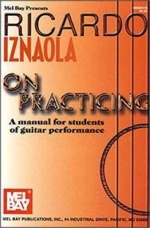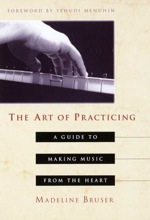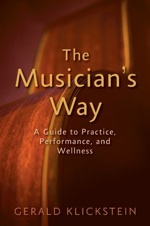Guitar Practice Tips
For some guitar practice is a time to de-stress and unwind. For others, it’s like a job — part of their professional music career or a serious hobby. Whether you’re in either boat or somewhere in the middle, chances are you don’t have enough practicing time. That’s where the Classical Guitar Blog can help. Most of the articles you’ll find here are about practicing more efficiently and practicing better.
Goal Oriented Guitar Practice
Goal Oriented Guitar Practice is about setting long term performance goals. Then taking those goals and breaking them up into actionable steps: what piece should have you learned by when? Then we get into the daily goals — what should you practice every day to accomplish your long term goals?
Daily goals come from your practice log in which you write down both what you did during a given practice session and your ideas about practicing and how to improve a given passage.
This is the overarching philosophy behind all guitar practice posts here on the Classical Guitar Blog.
Dealing with Practice Inconsistency
If you haven’t been playing long, chances are you notice some inconsistency during your practice time. Some days things work; others they don’t. The good news is the longer you play guitar, and the better you get a practicing, there will be less bad days and you will get more consistent.
Remember: focus on the the long term trends. Practicing is really an act of faith. You have to believe that what you’re doing is going to work in the long term. So be consistent and stick with it.
That said, try to evaluate and cut out stuff that isn’t working.
Taking Practice Breaks
One of the most underrated aspects of practicing is the time when you aren’t practicing at all. That’s why it’s really important to take one day off from practicing each week.
Sometimes those days off are the most important. You can take a break to improve.
That said you can still be productive during your practice break.
Fixing Mistakes
A mistake in performance is one of two things: (1) a complete fluke that just happened or (2) a real error that you built into your playing by faulty practicing.
Hard things, places where you make mistakes, are called practice events. They are places where you should utilize guitar practice techniques and try to practice perfect.
Practice Schedules and Finding Time to Practice
One of the easiest ways to find guitar practice time is to set aside a certain time every day. Enlist your family and friends, and make sure that they know that you have this sacred practice time. The rule: turn off your phone and computer, then go practice during that time 6 out of every 7 days. No exceptions.
Once you have that time, you can start thinking about practice schedules and how much time you spend working on individual aspects of your playing: technique, repertoire, etudes, etc.
Part of being an efficient practicer is knowing when to stop.
If you’re short on time, trying using a task oriented practice schedule. Also, remember that you can still be very effective with short practice sessions.
This is only a small sampling of some of the best posts. To see all posts about practicing, check out the practice category.
Books about Practicing
On Practicing by Ricardo Iznaola
 On Practicing is Ricardo Iznaola’s very successful attempt at producing a quick guide for undergraduate guitar performance majors. Iznaola covers what sorts of things should make up your practice time and how to problem solve. It’s a really solid collection of information for not a ton of money. My only critique is that Iznaola does have a very formal writing style, which can make some sections a bit unclear.
On Practicing is Ricardo Iznaola’s very successful attempt at producing a quick guide for undergraduate guitar performance majors. Iznaola covers what sorts of things should make up your practice time and how to problem solve. It’s a really solid collection of information for not a ton of money. My only critique is that Iznaola does have a very formal writing style, which can make some sections a bit unclear.
The Arts of Practicing by Madeline Bruser
 Madeline Bruser is a pianist, but The Art of Practicing is not piano specific. The book delves more into the spiritual and intellectual side of practicing and connecting with music. That said, there are some very practice tidbits: thoughts on posture and sitting and a breathing exercise to prepare yourself for a practice session are two examples. This may not be a book that you want to buy, but it’s worth checking out from the library.
Madeline Bruser is a pianist, but The Art of Practicing is not piano specific. The book delves more into the spiritual and intellectual side of practicing and connecting with music. That said, there are some very practice tidbits: thoughts on posture and sitting and a breathing exercise to prepare yourself for a practice session are two examples. This may not be a book that you want to buy, but it’s worth checking out from the library.
The Musician’s Way by Gerald Klickstein
 The Musician’s Way is probably one of the most complete books about being a musician ever published. It includes all sorts of advice, but practice advice makes up a significant portion of the book. If you’d like to learn more, check out my review of the book.
The Musician’s Way is probably one of the most complete books about being a musician ever published. It includes all sorts of advice, but practice advice makes up a significant portion of the book. If you’d like to learn more, check out my review of the book.
